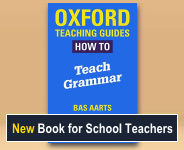Clauses
Clauses are considered to be very important units in the study of language. But what is a clause? What makes it different from a word, a phrase, or a sentence? Why are clauses so important?
A clause is a powerful structure because it can express a whole situation. Here’s an example:
- Dave cooked a fantastic curry last night.
This tells about something that happened. It is doing more than just a word on its own, like curry, or a phrase on its own, like a fantastic curry.
To express a situation, a clause usually needs to contain a verb phrase containing one or more verbs, like cooked in our example:
- Dave cooked a fantastic curry last night.
The National Curriculum's definition of a clause as "a special type of phrase whose head is a verb" presents us with a new way of looking at clauses. This may take some getting used to. However, the definition makes sense if you view a clause as a grouping of words in which one word stands out as pivotal, and this is the verb. This idea isn't really any different from regarding a group of words whose pivotal element is a noun as a noun phrase, and a string of words whose main element is an adjective as an adjective phrase.
Typically inside clauses there are also other phrases which tell us more about the situation, such as:
- who or what is involved (e.g. Dave, a fantastic curry)
- the circumstances, such as place or time (last night)
Our example can be used as a sentence:
- Dave cooked a fantastic curry last night.
So why talk about clauses instead of sentences? One important reason is that some clauses form only part of a sentence.
- Dave cooked a fantastic curry last night and Tess brought a cheesecake.
Here we have a sentence with two clauses, joined by and. We can see that Tess brought a cheesecake is also a clause: it has its own verb, brought, which tells us about another action that happened, and it includes other phrases to tell us who and what were involved in this action (Tess, a cheesecake).
A further point is that some clauses cannot be used on their own as whole sentences:
- after we ate the curry and cheesecake
This is incomplete on its own and needs to be used as part of a larger sentence, such as this one:
- After we ate the curry and cheesecake, we watched TV.
We’ve seen that clauses are central units of language which can be used to build sentences. Understanding how clauses work is very useful when it comes to writing in a varied and interesting style. Using different sorts of clauses in different structures can help you express yourself more clearly and with a greater degree of flexibility.
For example, if you write everything in simple sentences, it might be easy to understand what you mean, but it soon becomes dull and repetitive. On the other hand, writing everything in longer, more complicated sentences can help you create links between ideas, but it can also lose the reader’s attention and make them miss the point.
Understanding different types of clauses and how they work is also important in examinations. Examiners are keen to reward students who can write in a varied and engaging way. Not only that, but examiners like to see how students respond to what other people write, and how they can describe and comment on the techniques other writers use in their own writing.
One important point to remember here is that some clauses can make complete sense on their own and can become sentences in their own right, but some clauses do not express a full meaning on their own and have to be combined with other elements in order to create full sentences. As with many things in English grammar, there are exceptions, and once you become a more confident writer you can start to bend and break rules to create different effects.
Welcome!

Englicious is totally free for everyone to use!
But in exchange, we ask that you register for an account on our site.
If you’ve already registered, you can log in straight away.
Since this is your first visit today, you can see this page by clicking the button below.
- Printer-friendly version
- Log in to view or leave comments

